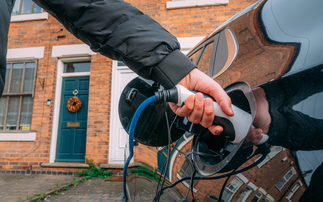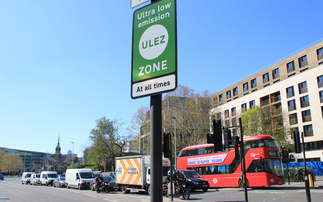JCB Jo Bamford sits down with BusinessGreen to discuss his plans to usher in the UK hydrogen economy through passenger buses
JCB heir Jo Bamford may be more frequently discussed alongside his billionaire industrialist father, but he says he owes a life-long interest in sustainability to his mother, who has run Daylesford Organic Farm in the Cotswolds for some 50 years.
"From about the age of seven I was either sent out with a farmer, or to the factory shop floor," he remembers. "I have this odd manufacturing background that is very, very rooted in sustainable living, restoring the soil and ecosystems - all that good stuff."
And as such, after a lifetime working for the family firm, Bamford is now preoccupied with another intersection between heavy-duty kit and sustainability goals, namely passenger buses powered by zero emissions hydrogen fuel technology.
Bamford parted ways from JCB in 2018 to found green hydrogen company Ryse Hydrogen and last year stepped into rescue the Northern Irish bus manufacturer Wrightbus, the company behind the world's first hydrogen-powered double decker, from administration. After more than 15 years observing the UK hydrogen sector from afar, he says he felt the time had arrived to get involved. And besides, he chuckles, "my dad doesn't want to retire, I don't want him to retire, and I don't want to be Prince Charles".
A dozen of Wrightbus' hydrogen buses have operated around London for years and Bamford saw an opportunity to complement his hydrogen production and refuelling business, which won a major contract to supply fuel to Transport for London in 2019, with a firm whose product offering could stimulate demand for the green fuel.
The bus manufacturer, best known for producing the hybrid 'Boris buses' launched across the capital in 2012, was in some ways familiar territory to Bamford, anyway. Like JCB, it is a family-run manufacturing business started after World War Two and staffed with "hard working people, salt of the earth people, people I'm used to and grew up with," Bamford reflects.
He now hopes to roll out several thousand hydrogen buses across the UK in the coming years, a fleet he believes could trigger economies of scale and justify the construction of green hydrogen infrastructure that could prove critical to the adoption of hydrogen technology at scale in other sectors, such as heating, shipping, rail, heavy industry, and perhaps even aviation.
Consequently, the industrialist is pressing the government to subsidise a 3,000-strong hydrogen bus fleet and help finance five green hydrogen production stations across the UK, investments he claims would kick-start the country's hydrogen economy, create jobs in the wake of the coronavirus crisis, shore up British energy sovereignty and reduce the UK's reliance on imported battery technologies as the country eschews internal combustion engines to meet its net zero target.
He may be in luck. After more than a decade of being overshadowed by lithium-ion battery technology - a phenomenon Bamford pins on Tesla founder Elon Musk, a man he stresses is "not an engineer or a manufacturer" - hydrogen cell technology is having a moment.
Despite Musk's contention that hydrogen fuel cells are "fool cells" and "staggeringly dumb" due to the inefficiency of turning electricity into a gas then back into electricity again, hydrogen fuel cells are widely acknowledged as one of the best decarbonisation solutions for heavy-duty vehicles, such as aviation, shipping, and freight, that have proven resistant to electrification. Hydrogen fuel cells also have the major benefit of being relatively light and, unlike battery-powered vehicles, able to refuel within minutes - a familiarity Bamford believes will be a hit with customers accustomed to rapid refuelling.
"Hydrogen is a wonderful zero emission energy fuel that most mimics how we make fuel today and how we operate with fuel today," Bamford argues. There is already a steady appetite for hydrogen buses, he adds, regardless of whether the government agrees to his mooted stimulus plans. Wrightbus is waiting for Covid-19 disruptions to ease to allow it to deliver 100 hydrogen buses that are currently on order from different parts of the UK, he says, including 20 double deckers destined for London.
Over recent months, hydrogen has risen up the political agenda and reports have suggested the Department for Business, Energy and Industrial Strategy will publish a hydrogen strategy before the Summer Recess, following calls from gas network operators and energy suppliers - including Ryse - for support for hydrogen to feature in Covid-19 rescue pacakages. The sector is heavily tipped to be a beneficiary of the first phase of the government's recovery package, set to be revealed this week. Last week the Prime Minister said the government intended to "invest massively in hydrogen", admitting that he was "a big fan of buses made in Ballymena" - a direct reference to Wrightbus' factory.
The government's enthusiasm for hydrogen is welcome news for the bus manufacturer, which was forced to announce a fresh spate of redundancies following the coronavirus shutdown of the business in May. "We've had to make unpleasant decisions and I've had many sleepless nights," Bamford admits. "We have had to cut our cloth according to what the market looks like. That's what's happened with Covid-19 and its part of the reason why I'm using whatever platform I have to fill that factory as fast as possible so we can employ people as fast as possible."
Ryse can already produce green hydrogen that is already as cheap as diesel, Bamford stresses, but hydrogen fuel cell buses currently cost double their diesel counterparts. However, he argues that costs would come down fast if the government stepped in to help scale up the market, as has been the case with numerous other clean technologies. "If the government gave us 3,000 buses, at the end of 3,000 buses, I could get the bus to cost the same as a diesel bus," Bamford predicts. "We can already deliver hydrogen for the same cost as running that bus on diesel. But if we get that volume, away we go."
However, Bamford is eager to stress that his vision is not "a bus plan", but a plan to stimulate the market dynamics required for the development of a green hydrogen sector that can operate without government support. "The reason I started with buses is not because I'm in love with the bus," he says. "But it's because it's the place to start with hydrogen."
An order of 3,000 buses, which is roughly 10 per cent of the UK's operational bus fleet, creates demand and volume, he says. It would allow Wrightbus to keep manufacturing costs down and sell cheaper buses, while justifying the construction of five new wind-powered hydrogen production plants in coastal regions of the UK. The plants, which would take just two years to build, would bring the cost of green hydrogen fuel down, and encourage engineers to apply hydrogen technology to more capital-intensive or one-off investments, such as trains and ferries, gas and heating.
Earlier this year, Ryse and Wrightbus presented a fully-costed plan to the government outlining how the UK could become a 'global leader' in hydrogen technologies. On top of asking for £300m over the four years to subsidise a new wave of buses, the firms suggested the government should support the construction of the hydrogen production stations through provisional loans, guarantees to underwrite elements of the financing, or capital subsidies. These interventions, the companies said, would create 1,000 jobs at Wrightbus and 150 jobs at Ryse Hydrogen.
Hydrogen, Bamford contends, is a no-brainer for the wet and windy UK. "Britain has an abundance of wind and an abundance of water," he reflects. "We don't make batteries. We don't own any of the chemistry that makes batteries. There's none of it in the ground."
Of course, the government has talked up ambitious plans to rapidly expand the UK battery sector, building on the country's R&D expertise and auto manufacturing base. Meanwhile, advocates of battery technologies are increasingly confident that the sector is on track to dominate much of the auto market and play an integral role in the decarbonisation of the power grid.
However, Bamford warns that an over-reliance on battery technology in the UK's decarbonisation plan would wed the country to currently coal-powered companies in China, heavy-diesel powered shipping routes, dubious mining practices in the Democratic Republic of the Congo, and battery waste issues. Hydrogen, on the other hand, gives the UK an attempt to establish true energy sovereignty and sustain "hundreds of thousands" of high-quality jobs in the UK in various sectors, including engineering, manufacturing, clean energy, and finance. "We could be world class, financing green hydrogen," he contends. "We could be world class, because we are there before anyone else".
Besides, he adds, it makes economic sense to invest in an industry where Britain has a competitive edge. In January, he visited a single Chinese battery manufacturer that had 80,000 professionals researching battery chemistry - eight times the total number of engineers that graduate from UK universities each year. "As a manufacturer, my view is, if you are going to be in green energy, you go somewhere where you can compete and come out on top, i.e. there's less competition," he says. "Playing catch-up in engineering is an incredibly difficult task… If you are going to be green in Britain, we've got wind, we've got water. Let's do that."
But the UK must act now to become a hydrogen leader, Bamford stresses. It faces stiff competition from Europe, particularly Germany, which has committed to spending €9bn on ramping up its hydrogen production capacity to 5GW by 2030 and 10GW 10 years later.
What does he think of the government's Covid-19 response so far? In a response not wholly unsurprising for an individual who has donated £35,000 to the Conservatives since late November, Bamford offers a favourable assessment. "Whether they are doing a good job or a bad job, they are bloody trying their hearts out, the poor buggers," he says. "I think they are doing their best."
What is important in this moment, he stresses, is that the government remains forward-thinking in its green recovery plans as it seeks to reboot the battered economy. "For every economy in the world, one of the strands to go and inflate the economy is to be going green - green jobs, green jobs," he says. "And every one of them is going to be chasing backwards, because that's what everyone tells them is green. But batteries don't do big and heavy stuff, they don't do heating.
"My contention is, with 74 per cent of all batteries coming from China, let's as a country go somewhere where there's less competition."
The Net Zero Leadership Hub is brought to you in partnership with BT, as part of its support for the Net Zero Leadership Stream at the world's first Net Zero Festival this autumn. All the content on the Hub is fully editorially independent unless otherwise stated. You can find out more about the Net Zero Festival and reserve your place here.
You can also hear Jo Bamford speak at the Festival as part of a stellar line up of green business leaders and thinkers.









